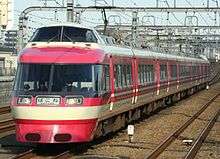Odakyu 7000 series LSE
| Odakyu 7000 series LSE | |
|---|---|
|
Odakyu 7000 series LSE in original livery, November 2007 | |
| In service | December 1980– |
| Family name | Romancecar |
| Constructed | 1980–1983 |
| Refurbishment | 1995–1997 |
| Number built | 44 vehicles (4 sets) |
| Number in service | 22 vehicles (2 sets) |
| Number scrapped | 22 vehicles (2 sets) |
| Formation | 11 cars per set |
| Fleet numbers | 7001–7004 |
| Operator(s) | Odakyu Electric Railway |
| Depot(s) | Kitami |
| Specifications | |
| Maximum speed | 110 km/h (70 mph) |
| Electric system(s) | 1,500 V DC |
| Current collection method | Overhead lines |
| Track gauge | 1,067 mm (3 ft 6 in) |
The Odakyu 7000 series LSE (小田急7000形 Odakyū 7000-gata) (Luxury Super Express) is an electric multiple unit (EMU) train type operated since December 1980 by Odakyu Electric Railway on "Romancecar" limited express services in Japan.
Design
The 7000 series LSE trains were the first new "Romancecars" introduced since the Odakyu 3100 series NSE 17 years previously. The overall styling represented an evolution of the 3100 series design, with 11 articulated carriages mounted on shared bogies.[1] The external livery of orange vermilion, grey, and white was also identical to that carried by the 3100 series. The passenger doors continued the folding style, but were automatically operated instead of the manually-operated doors of the 3100 series.[1]
 3100 series NSE side view
3100 series NSE side view 7000 series LSE side view
7000 series LSE side view
Operations
The 7000 series LSE sets are normally used on Hakone and Super Hakone services between Shinjuku and Hakone-Yumoto, and on Sagami services.[1]
Formations

The four 11-car articulated sets are formed as follows, with car 1 at the Odawara and Hakone end.[2][3]
| Car No. | 1 | 2 | 3 | 4 | 5 | 6 | 7 | 8 | 9 | 10 | 11 |
|---|---|---|---|---|---|---|---|---|---|---|---|
| Designation | M9c | M8 | T2 | M7 | M6 | M5 | M4 | M3 | T1 | M2 | M1c |
| Numbering | 7800 | 7700 | 7150 | 7600 | 7500 | 7400 | 7300 | 7200 | 7050 | 7100 | 7000 |
Cars 2, 5, 7, and 10 each have one single-arm pantograph.[2]
Interior
Passenger accommodation
Passenger accommodation consists of rotating/reclining pairs of seats arranged 2+2 abreast.[3] All cars are no-smoking.[2]
- Observation car seating, July 2007
- Seating with blue moquette, September 2006
- Seating with red moquette, October 2006
- Former refreshment counter, October 2007
Facilities
Cars 4 and 8 have toilet and washing facilities.[2] Cars 3 and 9 had refreshment counters, although since the 1990s, these are used as a base for trolley service sales.[1]
History
The first set, 7001, was delivered in December 1980, and entered service on 27 December of the same year.[3] One set was delivered each subsequent year, with the final set, 7004, delivered in December 1983.[3]
In 1981, the 7000 series LSE was awarded the Blue Ribbon Award, presented annually in Japan by the Japan Railfan Club for railway vehicles voted as being the most outstanding design of the year.[1]
The fleet was refurbished between 1995 and 1997 to improve accessibility, and new seat moquette was added. At the same time, the sets were repainted into a new livery of wine red and white based on that applied to the Odakyu 10000 series HiSE sets.[1]
From 2005, the original scissors-type pantographs were replaced with single-arm pantographs.[1]
In 2007, set 7004 was repainted back into its original livery to mark the 80th anniversary of Odakyu.[1]
In 2012, one of the two sets still in new livery was repainted back into the original livery, and the other set was withdrawn as of 19 February 2012, leaving two sets in service, both in the original livery.[4]
Train simulator version
The 7000 LSE is a player-driveable train in the 2001 Microsoft Train Simulator railroad simulator.
References
- 1 2 3 4 5 6 7 8 私鉄車両年鑑2012 [Japan Private Railways Annual 2012]. Tokyo, Japan: Ikaros Publications Ltd. February 2012. p. 170. ISBN 978-4-86320-549-9.
- 1 2 3 4 私鉄車両編成表 2011 [Private Railway Rolling Stock Formations - 2011]. Japan: Kotsu Shimbunsha. July 2011. p. 56. ISBN 978-4-330-22711-5.
- 1 2 3 4 "2007 小田急ロマンスカーオールガイド" [2007 Odakyu RomanceCar Comprehensive Guide]. Tetsudō Daiya Jōhō Magazine. Vol. 36 no. 277. Japan: Kōtsū Shimbun. May 2007. pp. 23–25.
- ↑ ロマンスカー・LSE(7000形)は、デビュー当時の塗装に統一します。 [7000 series LSE Romancecar fleet to be standardized in original livery] (pdf). News Release (in Japanese). Japan: Odakyu Electric Railway. 31 January 2012. Retrieved 20 February 2012.
External links
| Wikimedia Commons has media related to Odakyu 7000 series LSE. |
- Odakyu Romancecar Lineup (in Japanese)

